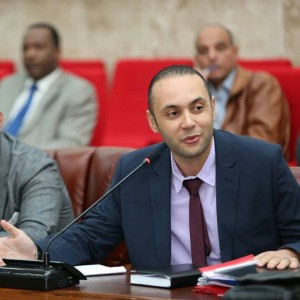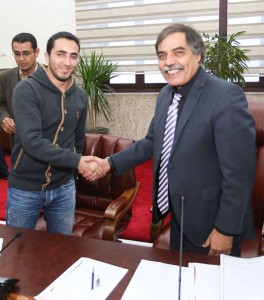[vc_row][vc_column width=”1/1″][vc_column_text]
Drafting new constitution, Libyan civil society speaks
By Jillian Slutzker
[/vc_column_text][/vc_column][/vc_row][vc_row][vc_column width=”2/3″][vc_column_text]Democracies are founded on the will of the people. But in al-Bayda, Libya—where members of the Constitutional Drafting Assembly have been working since April 2014 to create the framework for a democratic Libya—the voice of the people had been largely absent.
This changed in Dec. 2014, when 10 representatives from 4 civil society groups took to the podium in the assembly’s chambers, speaking to assembly President Ali Tarhouni and 16 members from the body’s 8 committees.
Revealing their findings from focus groups held across the country, the speakers voiced the views of thousands of Libyans on key constitutional issues, including national reconciliation, local governance, extractive industries, the role of the army and police, transparency, youth and women’s rights.
“The role of civil society is vital to ensure Libyan citizens are engaged in the ongoing transitional efforts in Libya….Civil society organizations not only inform the public about transitional issues but, importantly, they gather public opinion in a certain geographical area or on a certain issue and are able to feed public opinion back to policy makers and lawmakers ensuring greater public participation in key transitional matters,” says Mansoor Mirza, Chief of Party for the Libyan Engagement and Governance through Applied Learning program.
The program works to boost organizations’ ability to build consensus and influence the constitutional drafting process. It is funded by the U.S. State Department’s Middle East Partnership Initiative and implemented by Creative Associates International.
“Civil society has a unique opportunity to play a meaningful role in Libya’s transition. But this may be hard won, given the current tensions in country,” says Kourtney Pompi, a civil society trainer for the program.
Libya has been plagued by political tensions and militia fighting since the fall of Muammar Gaddafi. Gaps in citizen knowledge about the new political process and a lack of technical experience have also prevented civil society from playing an active role in dialogue and advocacy around the new constitution.
The ABCs of advocacy

During an intensive four-day workshop in Djerba, Tunisia, the program’s grantees gained skills in in building consensus, spearheading advocacy, formulating policy and reaching out to media.
“Prior to the trainings, the [civil society organizations] lacked focus and specificity in their messaging,” says Michael Wasco, a constitutional attorney and a trainer for the program. “The trainings and discussions helped the groups distill their positions and data into succinct and clear recommendations.”
Participants in the training represented the Libyan Public Policy Forum (LPPF), Women and Youth Empowerment Forum (WYEF), National Caucus Fazzan (NCF) and H2O, a youth organization.
During the past several months, the groups have held public forums around the country, collecting citizens’ opinions and concerns on key constitutional issues and turning those into policy points to deliver to the Constitutional Drafting Assembly.
Wasco says that through role play scenarios, mock presentations and consensus-building and communication exercises, participants sharpened their oral presentation skills and messaging.
Pompi adds that the trainings also helped groups crystallize their policy positions and understand “the value of being direct about what they wanted from the [Constitutional Drafting Assembly] members.”
In a heated and divisive political environment, Pompi says, the civil society trainees are now better prepared to discuss priority issues with officials and other groups with dissenting perspectives or priorities.
“Remaining politically impartial in a highly polarized and uncertain political environment is vital in establishing and maintaining trust with the [Constitutional Drafting Assembly],” says Mirza.
Through their trainings, the civil society organizations learned how to present their findings so that they were not seen as “pushing a particular political agenda but were providing objective information gathered from nationwide citizen public forums that is important for constitution drafters in ensuring the constitution reflects public opinion,” Mirza says.
Connections for democratic engagement

At the groups’ presentation in al-Bayda, President Tarhouni said he hoped that there would be a greater level of coordination between civil society and the assembly in the upcoming public consultation phase of the constitutional drafting process.
In bilateral conversations following the meeting, individual civil society representatives and assembly members established personal connections for ongoing communication. This engagement with individual assembly members on an individual constituency basis is key, says Mirza.
To date, the four organizations trained through the Libyan Engagement in Governance through Applied Learning program are the only civil society groups that have met with assembly members directly in al-Bayda to discuss the constitution.
This government-civil society relationship will be critical to a successful constitution-drafting process. Although program grantees, and other civil society groups, can hone their organizing and advocacy skills through training, their efforts will be ineffective if they are met with closed doors and deaf ears, say program trainers.
“Civil society has an opportunity to contribute to consensus building within the country, as they have the trust of their communities, if government is willing to engage them meaningfully in the transition process,” says Pompi.
These meetings are an important step toward this successful democratic transition.[/vc_column_text][/vc_column][vc_column width=”1/12″][/vc_column][vc_column width=”1/4″][vc_widget_sidebar sidebar_id=”sidebar-primary”][/vc_column][/vc_row]